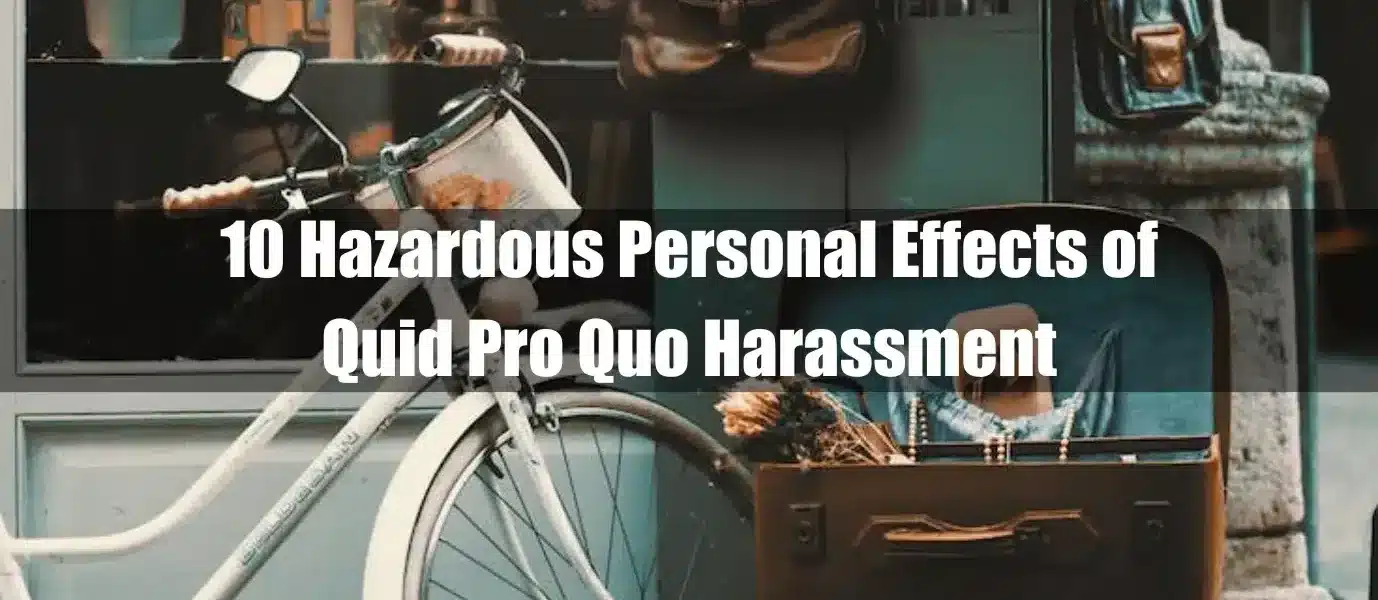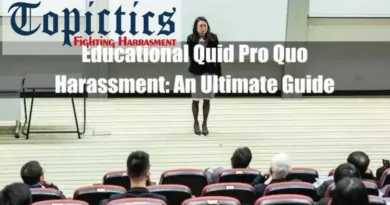Quid pro quo harassment, a form of sexual harassment where a person in a position of power demands sexual favors in exchange for something of value, is a pervasive and damaging phenomenon with far-reaching personal consequences. The power imbalance inherent in this type of harassment creates a dynamic where individuals feel coerced and violated, leaving them with deep and lasting emotional scars. Beyond the immediate psychological trauma, quid pro quo harassment can have a profound impact on self-esteem, trust, social functioning, and overall well-being.
I. Personal Effects of Quid Pro Quo Harassment
1. Psychological Trauma: A Deep and Lingering Impact

The psychological impact of quid pro quo harassment is profound and can manifest in various ways. Victims often experience anxiety, depression, and post-traumatic stress disorder (PTSD). Nightmares, flashbacks, and avoidance of places or people associated with the harassment are common symptoms. The constant threat of recurrence can lead to heightened vigilance and a perpetual state of fear.
2. Emotional Distress: A Heavy Burden to Bear
The emotional toll of quid pro quo harassment is significant. Victims often feel violated, humiliated, and betrayed. These emotions can manifest as anger, sadness, frustration, and helplessness. The sense of being exploited and taken advantage of can erode self-worth and leave individuals struggling to cope with the emotional turmoil.
3. Damage to Self-Esteem: A Fragile Foundation Shaken
Quid pro quo harassment can shatter an individual’s self-esteem. The experience of being pressured or coerced into something against one’s will can lead to feelings of worthlessness and inadequacy. The belief that one’s value is tied to external factors rather than intrinsic qualities can deeply damage self-perception and personal identity.
4. Loss of Trust: A Foundation of Relationships Eroded

The experience of quid pro quo harassment can erode trust in others, making it difficult to form and maintain healthy relationships. The fear of being betrayed or exploited can lead to social withdrawal and isolation. Rebuilding trust in others requires time, support, and a willingness to confront painful memories.
5. Impaired Social Functioning: A Social Life Disrupted
Social withdrawal and isolation are common consequences of quid pro quo harassment. Victims may find it difficult to maintain existing relationships or form new ones. The fear of judgment or retaliation can prevent them from engaging in social activities, leading to feelings of loneliness and isolation.
6. Fear and Anxiety: A Constant Companion
The pervasive fear of recurrence is a constant companion for victims of quid pro quo harassment. The constant threat of being exploited again can overshadow daily life, making it difficult to relax or feel safe. This fear can manifest as anxiety, panic attacks, and hypervigilance.
7. Helplessness and Powerlessness: A Crushing Feeling of Control Lost
Quid pro quo harassment strips individuals of their sense of control and leaves them feeling helpless and powerless. The experience of being forced into an unwanted situation can erode self-efficacy and make it difficult to make autonomous decisions. Regaining a sense of control and empowerment is crucial for healing and recovery.
8. Betrayal and Humiliation: A Profound Emotional Wound
The deep sense of betrayal and humiliation inflicted by quid pro quo harassment is a profound emotional wound. The experience of being violated and exploited can lead to feelings of shame, worthlessness, and degradation. Processing and healing from these emotions require support, validation, and a safe space to express one’s pain.
9. Professional Impact: A Career Derailed
Quid pro quo harassment can have a devastating impact on an individual’s professional life. Victims may experience job loss, performance decline, and limited opportunities. The fear of retaliation can prevent them from speaking up, further jeopardizing their career prospects.
10. Long-Term Health Consequences: A Body Bearing the Burden

The psychological stress of quid pro quo harassment can trigger or exacerbate chronic health conditions. The constant emotional turmoil can manifest as physical symptoms such as headaches, digestive problems, insomnia, and muscle tension. Holistic healthcare that addresses both psychological and physical effects is essential for long-term recovery.
II. Conclusion: A Call for Awareness and Action

Quid pro quo harassment stands as a stark reminder of the power imbalances that can breed exploitation and abuse. The profound and lasting psychological, emotional, and social consequences it has on victims demand a collective effort to eradicate this abhorrent practice.
Awareness is the first step towards dismantling the culture of silence that often surrounds quid pro quo harassment. Educating individuals about their rights, empowering them to speak up against injustice, and fostering open communication channels are crucial steps in prevention.
Support for victims is an essential pillar in the fight against quid pro quo harassment. Creating safe spaces for victims to seek help, providing access to professional counseling, and ensuring legal representation are vital components of a comprehensive support system.
The time to act is now. By fostering a culture of respect, equality, and zero tolerance for harassment, we can create a world where individuals are free from the fear and humiliation of quid pro quo harassment. Let us stand together in our commitment to protecting the dignity and well-being of all.










Comments are closed.